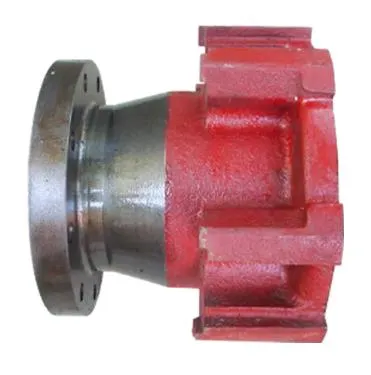Móvil:+86-311-808-126-83
Correo electrónico:info@ydcastings.com
Maximize Pump Performance with Precision-Engineered Components
The world of fluid mechanics is evolving rapidly, driven by the need for higher efficiency, better durability, and cost-effective solutions across industries. Whether dealing with municipal water systems, chemical processing, or HVAC installations, engineers and operators increasingly rely on smart pump component choices to optimize performance. Material resilience, structural precision, and adaptability to varying pressure environments are just a few of the critical factors that determine long-term operational success. Among the most vital parts in this domain are pump volute casings, impellers, pipe caps, and specialized housings—all of which contribute to consistent flow rates, pressure control, and minimized energy loss.

Enhancing Flow Direction and Pressure with a pump volute casing
El pump volute casing is more than just a container—it is a precision-shaped housing that plays a central role in energy conversion within centrifugal pumps. By capturing the velocity of the fluid discharged from the impeller and gradually converting it into pressure, this spiral-shaped component enhances the efficiency of the entire system. Typically cast from stainless steel, cast iron, or advanced polymers, the casing must resist erosion and accommodate a range of temperatures. Its geometry is essential to prevent turbulence and imbalance, ensuring smooth and uninterrupted flow. Industrial sectors like oil & gas and chemical processing rely on well-designed volute casings to maintain reliable output under continuous operation.
Reducing Energy Loss through the Strategic Use of a vortex casing
When designing pumps for applications involving abrasive or viscous liquids, engineers often turn to a vortex casing for its unique ability to minimize impeller wear and prevent clogging. Unlike traditional casings, a vortex casing creates a whirlpool effect that allows solids to pass through without direct contact with the impeller, making it ideal for sewage, slurry, or stormwater systems. Its design reduces the mechanical load on the pump while enhancing operational longevity. Additionally, this configuration promotes lower NPSH (Net Positive Suction Head) requirements, which helps in preventing cavitation and maintaining consistent flow even under challenging inlet conditions.
Sealing Pipe Systems Reliably with a stainless steel pipe cap
In any piping system, especially those used for transporting liquids under pressure, the stainless steel pipe cap serves a crucial sealing function. These caps terminate open ends, providing protection from contamination, debris entry, or unwanted leakage. Manufactured in a range of sizes and wall thicknesses, they are compatible with various pipe standards and diameters. Due to their corrosion resistance, stainless steel caps are widely used in petrochemical, food processing, and marine industries. Whether welded, threaded, or slip-on, these components ensure long-term integrity in environments where hygiene, pressure, and thermal stability are paramount.
Supporting Critical Hydraulic Performance with a Precision-Formed carcasa de bomba de agua
El carcasa de bomba de agua houses the impeller and channels fluid from the suction to the discharge side, making it a core structure in both residential and industrial water systems. The casing must balance hydraulic efficiency with mechanical strength, ensuring that it supports the desired pressure without cracking or corroding. Whether used in firefighting systems or agricultural irrigation, the water pump casing is typically made from ductile iron, bronze, or stainless steel. It is designed to minimize hydraulic losses and maximize service life, even in environments with fluctuating loads or variable-speed drive systems.
Understanding the Market Dynamics Behind the water pump impeller price
When evaluating the water pump impeller price, one must consider the material composition, design complexity, production scale, and intended application. Impellers made from stainless steel or bronze tend to be more expensive due to their superior corrosion resistance and strength, whereas plastic or composite impellers are more cost-effective for low-pressure applications. Additionally, factors such as closed versus open impeller design, dynamic balancing, and compatibility with specific casings can significantly impact pricing. The price is not merely a number; it reflects the engineering quality and lifecycle expectations of the impeller in demanding use cases such as HVAC, mining, and municipal water supply systems.
Why is the geometry of a pump volute casing so important?
The spiral shape of a pump volute casing ensures that fluid velocity is efficiently converted into pressure, minimizing turbulence and reducing energy loss while optimizing flow consistency.
How does a vortex casing improve handling of solids-laden fluids?
A vortex casing creates a separation between the impeller and the solid particles by generating a swirl, allowing solid materials to pass through without damaging internal components, thus extending pump life.
Pump Volute Casing FAQs
Q: What materials are typically used for a pump volute casing?
A: Common materials include stainless steel, cast iron, and thermoplastic composites, chosen based on the fluid type, temperature, and pressure involved in the application.
Q: Are vortex casings suitable for residential use?
A: While vortex casings are primarily used in industrial applications, they can be beneficial in homes with frequent clogging issues due to sediment-rich or greywater systems.
Q: How does a stainless steel pipe cap prevent contamination?
A: By sealing the open ends of pipes tightly, the stainless steel cap keeps out external contaminants like dirt, moisture, and corrosive agents, ensuring system hygiene and reliability.
Q: What is the expected lifespan of a water pump casing under constant operation?
A: When made from high-grade materials and used within specified conditions, a water pump casing can last 10–20 years or more, depending on maintenance and operational stress.
Q: What factors most influence the water pump impeller price?
A: Material type, impeller size, manufacturing process (cast vs. machined), and whether it's a custom or standard design all contribute to pricing variations.
-
Materials Used in Manufacturing Cap End Pipe FittingsNoticiasNov.24,2025
-
Material Properties of CF8M CastingNoticiasNov.24,2025
-
How to Inspect Pump Cap Ends for DamageNoticiasNov.21,2025
-
Backward Curved Impeller – Efficient Airflow Solutions for Industry | YD CastingsNoticiasNov.21,2025
-
Automobile Water Pump - Efficient, Quiet, Durable & ElectricNoticiasNov.21,2025
-
Impeller for Pumps – High-Efficiency, Durable, OEM-ReadyNoticiasNov.21,2025











